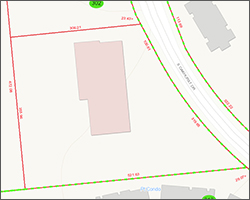Pro-life events like protests and rallies are typically held on public property, where your First Amendment rights are protected. But how can you tell what’s public property and what’s private? Fortunately, there are some easy ways to figure out exactly where you can hold your event without disruption from abortion facility employees, business owners, or the general public.
- Identifying public easements
- Searching government property maps
- Locations that look public but are not
- Dealing with disputes about public property
Identifying public easements
Along most public roads, there is a public easement, which is a strip of land at the edge of a private parcel of land that the public is free to use for travel. Typically this easement is about 15 feet. This is a perfectly acceptable place for you to hold a pro-life event.
Easements can be identified visually by looking for public works. If local government has placed things like sidewalks, bike paths, utility poles, or fire hydrants on a piece of land, that usually indicates the presence of an easement, and therefore public property.
Searching government property maps

Many counties maintain online maps that show every parcel of property in the county. If you’re unsure where property lines fall, these are an invaluable resource.
To utilize these maps, simply find your county assessor’s website, and search for the parcel of land you’re looking for. It should show you an exact outline of the property. Any land outside the boundaries of a piece of privately owned land is public and could be a suitable location for your event.
If your county doesn’t offer this service, or you’re unsure about the results you find, a call or visit to the assessor’s office should be able to clear it up.
Locations that look public but are not
Some locations may seem like public property, but are not. Roads going through places like shopping malls and other areas that the public accesses very often are completely private roads, and therefore have no public easement except around the outside of the entire mall area.
In other cases, local governments may lease public property to private or semi-private entities. For example, some sections of sidewalk in downtown Chicago are “owned” by the hotels or other businesses they situated in front of. The legal status of protesters at such locations has become the subject of litigation; if alternative locations are available, it’s best to choose a spot that is unambiguously public property.
If you have any questions, make sure you’ve done a thorough search on the assessor’s website or made inquiries with the assessor or police to be sure your event is on public property. Contact the Pro-Life Action League if you need help making a determination about a particular piece of land.
Dealing with disputes about public property

Many property owners are unaware of the existence of public easements, and may dispute your right to be on what they perceive to be their property. If the property owner is the abortion business you’re protesting, they have every incentive to scuttle your event and may try to tell you you can’t be where you are.
If you’re confident that you are, in fact, on public property, your best course of action is to inform them that you actually are allowed to be on the easement. If they persist in objecting to your presence, you can tell them to contact the authorities if they don’t believe you are correct.
Further, sometimes police are unaware of public easements and may try to tell you that you’re not allowed to hold your event in your selected location. If this occurs, first try to persuade them of the fact that there is a public easement. Point out any public works on the land, or other pedestrians walking on the land in question.
If the patrol office is not convinced, but you’re confident you’re on public land, call police headquarters and ask for a higher higher ranking officer called to come to the scene to deal with the situation. This will both hopefully bring a cooler head with more knowledge to the scene, and buy you time to continue your event until that officer arrives. For more tips on situations like this, see Working with police at your pro-life event, which also addresses when to seek the assistance of pro-life attorneys.
If the police are obstinate in insisting you cannot be on the property, your best course of action is to comply, and later contact the Pro-Life Action League. We will assess the situation and work with you to decide if further action is required, including filing a civil rights lawsuit.
It is of utmost importance to the pro-life movement as a whole—and to our entire democracy—that we not let our First Amendment rights be infringed simply because people are opposed to our constitutionally protected activities. Let us claim our rightful place in the public square!
